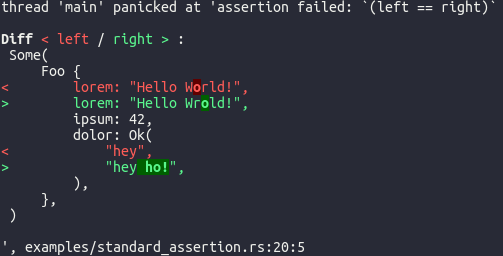# Pretty Assertions
[](https://crates.io/crates/pretty-assertions)
[](https://docs.rs/pretty_assertions)
[](https://crates.io/crates/pretty-assertions)
[](https://crates.io/crates/pretty-assertions)
Overwrite `assert_eq!` with a drop-in replacement, adding a colorful diff.
## Usage
When writing tests in Rust, you'll probably use `assert_eq!(a, b)` _a lot_.
If such a test fails, it will present all the details of `a` and `b`.
But you have to spot the differences yourself, which is not always straightforward,
like here:

Wouldn't that task be _much_ easier with a colorful diff?

Yep — and you only need **one line of code** to make it happen:
```rust,ignore
use pretty_assertions::{assert_eq, assert_ne};
```
<details>
<summary>Show the example behind the screenshots above.</summary>
```rust,ignore
// 1. add the `pretty_assertions` dependency to `Cargo.toml`.
// 2. insert this line at the top of each module, as needed
use pretty_assertions::{assert_eq, assert_ne};
fn main() {
#[derive(Debug, PartialEq)]
struct Foo {
lorem: &'static str,
ipsum: u32,
dolor: Result<String, String>,
}
let x = Some(Foo { lorem: "Hello World!", ipsum: 42, dolor: Ok("hey".to_string())});
let y = Some(Foo { lorem: "Hello Wrold!", ipsum: 42, dolor: Ok("hey ho!".to_string())});
assert_eq!(x, y);
}
```
</details>
## Semantic Versioning
The exact output of assertions is **not guaranteed** to be consistent over time, and may change between minor versions.
The output of this crate is designed to be read by a human. It is not suitable for exact comparison, for example in snapshot testing.
This crate adheres to semantic versioning for publically exported crate items, **except** the `private` module, which may change between any version.
## Tip
Specify it as [`[dev-dependencies]`](http://doc.crates.io/specifying-dependencies.html#development-dependencies)
and it will only be used for compiling tests, examples, and benchmarks.
This way the compile time of `cargo build` won't be affected!
Also add `#[cfg(test)]` to your `use` statements, like this:
```rust,ignore
#[cfg(test)]
use pretty_assertions::{assert_eq, assert_ne};
```
## Notes
- Since `Rust 2018` edition, you need to declare
`use pretty_assertions::{assert_eq, assert_ne};` per module.
Before you would write `#[macro_use] extern crate pretty_assertions;`.
- The replacement is only effective in your own crate, not in other libraries
you include.
- `assert_ne` is also switched to multi-line presentation, but does _not_ show
a diff.
- Under Windows, the terminal state is modified to properly handle VT100
escape sequences, which may break display for certain use cases.
- The minimum supported rust version (MSRV) is 1.35.0
### `no_std` support
For `no_std` support, disable the `std` feature and enable the `alloc` feature:
```toml
# Cargo.toml
pretty_assertions = { version= "...", default-features = false, features = ["alloc"] }
```
## License
Licensed under either of
- Apache License, Version 2.0, ([LICENSE-APACHE](LICENSE-APACHE) or <http://www.apache.org/licenses/LICENSE-2.0>)
- MIT license ([LICENSE-MIT](LICENSE-MIT) or <http://opensource.org/licenses/MIT>)
at your option.
### Contribution
Unless you explicitly state otherwise, any contribution intentionally
submitted for inclusion in the work by you, as defined in the Apache-2.0
license, shall be dual licensed as above, without any additional terms or
conditions.
## Development
- Cut a new release by creating a GitHub release with tag. Crate will be built and uploaded to crates.io by GHA.